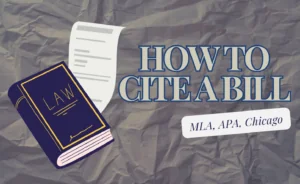Despite the appeal of technology, books still are valued sources of information for essays, dissertations, and scholarly research. However, not every research project need the citation of a whole tome; in many cases, the specific insights sought are contained inside a single chapter. Referencing them correctly, particularly using the Modern Language Association (MLA) style, is the basis of good work. So, let’s break down how to cite a chapter in a book MLA in simple steps, so you don’t feel overwhelmed in the process.

✅ AI Essay Writer ✅ AI Detector ✅ Plagchecker ✅ Paraphraser
✅ Summarizer ✅ Citation Generator
The Checklist of Elements for Proper Citing in MLA
Citing a book chapter in MLA format involves several key elements that should follow academic standards. The attention to detail will help your readers refer to the original book to verify sources and deepen their understanding. Make sure you haven’t missed any of the following:
✔️ the chapter author(s)
✔️ the title of the chapter
✔️ the book title
✔️ the editor(s) or author of the book
✔️ the publisher
✔️ the year of publication
✔️ the page numbers of the cited chapter.
How to Cite a Chapter in a Book in MLA
The MLA citation style (now in its 9th edition) is a widely popular citation style, used in many disciplines. When citing a book chapter, MLA book citation generator provides a great way to acknowledge the original work, while guiding readers to the cited information if they need it.
The basic format for a book chapter citation in MLA is as follows:
Chapter Author(s). “Title of the Chapter.” Title of the Book, edited by Editor(s) or Author of the Book, Publisher, Year of Publication, pp. Page Numbers.
To provide an example that aligns with the MLA citation format for a book chapter, let’s choose a classic American literature book with distinct chapters and cite one of its chapters accordingly. A suitable choice is Mark Twain’s The Adventures of Huckleberry Finn, which is divided into numerous chapters, each with its own title.

This example reflects the MLA format for citing a specific chapter within a book, including the chapter author (if different from the book author), the title of the chapter in quotation marks, the title of the book in italics, the publisher, the year of publication, and the page numbers of the chapter.
The ability to correctly cite a book chapter demonstrates a scholar’s attention to detail and honesty. It is a key principle for many references, from APA bible citation to legal citations, and so on. So, we hope that with the help of our guide you will be able to do your MLA citations justice. If you’re still not sure how to approach it, check out our Citation Generator below.
FAQ
Follow us on Reddit for more insights and updates.





Comments (0)
Welcome to A*Help comments!
We’re all about debate and discussion at A*Help.
We value the diverse opinions of users, so you may find points of view that you don’t agree with. And that’s cool. However, there are certain things we’re not OK with: attempts to manipulate our data in any way, for example, or the posting of discriminative, offensive, hateful, or disparaging material.